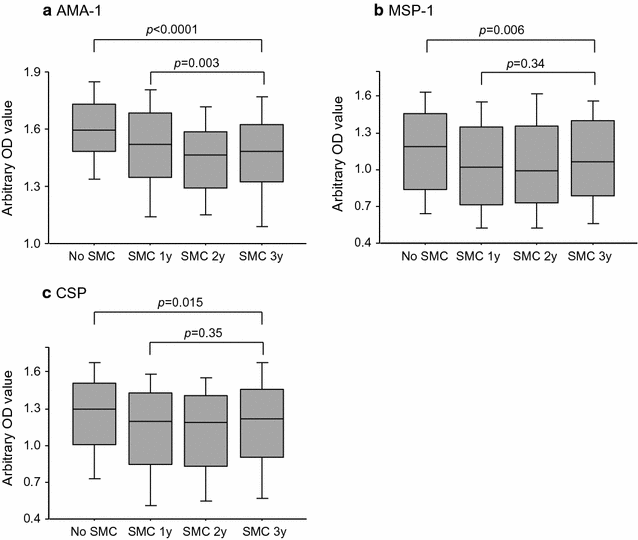Effect of seasonal malaria chemoprevention on the acquisition of antibodies to Plasmodium falciparum antigens in Ouelessebougou, Mali
- PMID: 28720100
- PMCID: PMC5516340
- DOI: 10.1186/s12936-017-1935-4
Effect of seasonal malaria chemoprevention on the acquisition of antibodies to Plasmodium falciparum antigens in Ouelessebougou, Mali
Abstract
Background: Seasonal malaria chemoprevention (SMC) is a new strategy to reduce malaria burden in young children in Sahelian countries. It consists of the administration of full treatment courses of sulfadoxine-pyrimethamine plus amodiaquine to children at monthly intervals during the malaria season. However, it is not clear if there is a cumulative effect of SMC over time on acquisition of antibodies to malaria antigens.
Methods: A cross-sectional serosurvey was carried out 1 month after the last dose of SMC in 2016. Children aged 3-4 years were randomly selected from areas where SMC was given for 1, 2 or 3 years during the malaria season. Children in the areas where SMC had been implemented for 1 year but who failed to receive SMC were used as comparison group. Antibody extracted from dry blood spots was used to measure IgG levels to CSP, MSP-142 and AMA1.
Results: The prevalence of antibodies to AMA-1 were high and similar in children who received SMC for 1, 2 or 3 years and also when compared to those who never received SMC (96.3 vs 97.5%, adjusted OR = 0.99, 95% CI 0.33-2.97, p = 0.99). The prevalence of antibodies to MSP-142 and to CSP were similar in children that received SMC for 1, 2 or 3 years, but were lower in these children compared to those who did not receive SMC (87.1 vs 91.2%, adjusted OR = 0.55, 95% CI 0.29-1.01, p = 0.05 for MSP-142; 79.8 vs 89.2%, adjusted OR = 0.52, 95% CI 0.30-0.90, p = 0.019 for CSP).
Conclusions: SMC reduced seropositivity to MSP-142 and CSP, but the duration of SMC did not further reduce seropositivity. Exposure to SMC did not reduce the seropositivity to AMA1.
Keywords: Antibody; Seasonal malaria chemoprevention; Seropositivity.
Figures

Similar articles
-
Effect of 4 years of seasonal malaria chemoprevention on the acquisition of antibodies to Plasmodium falciparum antigens in Ouelessebougou, Mali.Malar J. 2021 Jan 7;20(1):23. doi: 10.1186/s12936-020-03542-9. Malar J. 2021. PMID: 33413417 Free PMC article.
-
Effect of three years' seasonal malaria chemoprevention on molecular markers of resistance of Plasmodium falciparum to sulfadoxine-pyrimethamine and amodiaquine in Ouelessebougou, Mali.Malar J. 2022 Feb 8;21(1):39. doi: 10.1186/s12936-022-04059-z. Malar J. 2022. PMID: 35135546 Free PMC article.
-
Evidence that seasonal malaria chemoprevention with SPAQ influences blood and pre-erythrocytic stage antibody responses of Plasmodium falciparum infections in Niger.Malar J. 2021 Jan 1;20(1):1. doi: 10.1186/s12936-020-03550-9. Malar J. 2021. PMID: 33386070 Free PMC article.
-
Systematic Review and Meta-Analysis of Seasonal Malaria Chemoprevention.Am J Trop Med Hyg. 2023 Dec 11;110(1):20-31. doi: 10.4269/ajtmh.23-0481. Print 2024 Jan 3. Am J Trop Med Hyg. 2023. PMID: 38081050 Free PMC article.
-
Effect of seasonal malaria chemoprevention in children between 5 and 9 years old in Kita and Bafoulabe districts, Mali.Parasite Epidemiol Control. 2022 Jun 22;18:e00258. doi: 10.1016/j.parepi.2022.e00258. eCollection 2022 Aug. Parasite Epidemiol Control. 2022. PMID: 35789762 Free PMC article. Review.
Cited by
-
Assessment of the Feasibility, Acceptability, and Impact of Implementing Seasonal Malaria Chemoprevention in Nampula Province, Mozambique: Protocol for a Hybrid Effectiveness-Implementation Study.JMIR Res Protoc. 2021 Sep 15;10(9):e27855. doi: 10.2196/27855. JMIR Res Protoc. 2021. PMID: 34524109 Free PMC article.
-
Effect of 4 years of seasonal malaria chemoprevention on the acquisition of antibodies to Plasmodium falciparum antigens in Ouelessebougou, Mali.Malar J. 2021 Jan 7;20(1):23. doi: 10.1186/s12936-020-03542-9. Malar J. 2021. PMID: 33413417 Free PMC article.
-
A roadmap for understanding sulfadoxine-pyrimethamine in malaria chemoprevention.Parasitology. 2025 Feb;152(2):133-142. doi: 10.1017/S0031182025000071. Parasitology. 2025. PMID: 39844654 Free PMC article. Review.
-
Effect of Seasonal Malaria Chemoprevention on Immune Markers of Exhaustion and Regulation.J Infect Dis. 2020 Jan 1;221(1):138-145. doi: 10.1093/infdis/jiz415. J Infect Dis. 2020. PMID: 31584094 Free PMC article.
-
Predicting the likelihood and intensity of mosquito infection from sex specific Plasmodium falciparum gametocyte density.Elife. 2018 May 31;7:e34463. doi: 10.7554/eLife.34463. Elife. 2018. PMID: 29848446 Free PMC article.
References
-
- World malaria report 2016. Geneva: World Health Organization. http://www.who.int/malaria/publications/world-malaria-report-2016/en/.
-
- WHO Policy Recommendation: seasonal malaria chemoprevention (SMC) for Plasmodium falciparum malaria control in highly seasonal transmission areas of the Sahel sub-region in Africa. http://www.who.int/malaria/publications/atoz/who_smc_policy_recommendati....
-
- Dicko A, Sagara I, Sissoko MS, Guindo O, Diallo AI, Kone M, et al. Impact of intermittent preventive treatment with sulphadoxine-pyrimethamine targeting the transmission season on the incidence of clinical malaria in children in Mali. Malar J. 2008;7:123. doi: 10.1186/1475-2875-7-123. - DOI - PMC - PubMed
-
- Konate AT, Yaro JB, Ouedraogo AZ, Diarra A, Gansane A, Soulama I, et al. Intermittent preventive treatment of malaria provides substantial protection against malaria in children already protected by an insecticide-treated bednet in Burkina Faso: a randomised, double-blind, placebo-controlled trial. PLoS Med. 2011;8:e1000408. doi: 10.1371/journal.pmed.1000408. - DOI - PMC - PubMed
Publication types
MeSH terms
Substances
LinkOut - more resources
Full Text Sources
Other Literature Sources
Research Materials

